Are there any other wind turbines?
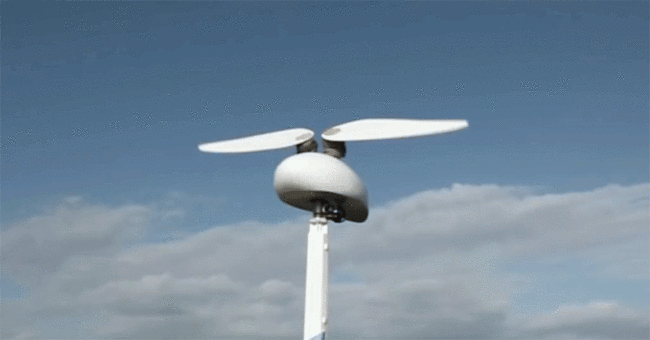
Flapping wing wind turbine | Youtube/tyer wind
This cute "little rabbit" can actually generate
electricity? That's right! While it flaps its "wings" in the wind, it
is continuously outputting electricity.
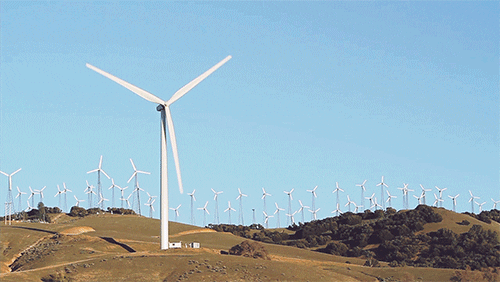
Mainstream three-blade wind turbine | Pixabay
When you mention "wind turbine", does the "three-bladed white windmill" immediately come to your mind? In addition to this classic shape, real wind turbines also have
various magical shapes.
Why three blades?
As the "originator" of wind turbines, windmills
played a huge role in drainage in the Netherlands and became world-famous. The
image of the four-bladed Dutch windmill is also deeply rooted in people's
hearts.

Multi-blade windmill | Pixabay
Four-blade or even multi-blade windmills have already taken
shape. Why did the wind turbine become a three-blade windmill?
The number of blades will not directly affect the energy
utilization. On the contrary, too many blades will interfere with the air flow
and reduce the utilization of wind energy. Wind energy utilization equipment
can only capture and utilize up to 59.3% of the kinetic energy in the wind. In
this way, a wind turbine can generate the same amount of electricity even with
only one blade.
However, single-blade wind turbines have not become mainstream. A single blade will cause the wind wheel to be extremely unbalanced, seriously threatening the safety of the entire wind turbine.
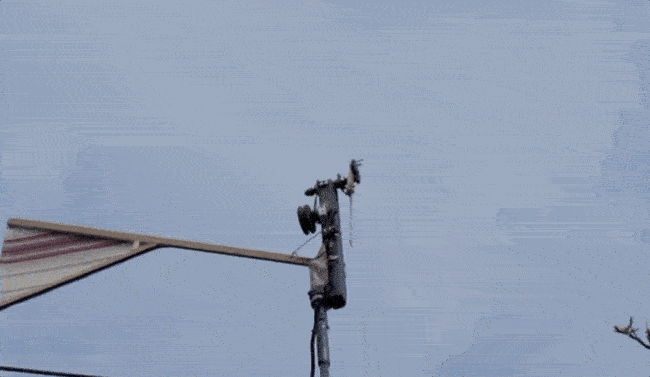
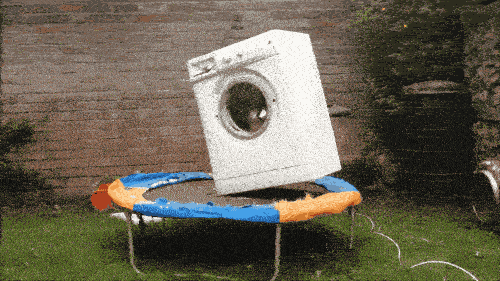
A washing machine that spins like crazy | Giphy
Two symmetrical blades can improve this unbalanced force situation, but they are still not stable enough. Until more ideal load control technology emerges, the application of two-blade wind turbines will still be limited.
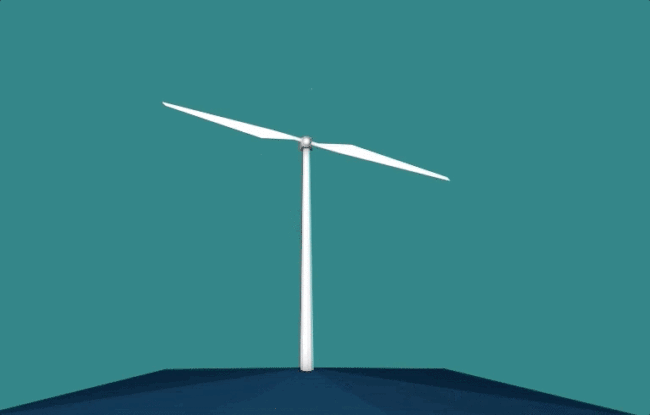
Schematic diagram of a two-blade wind turbine |
Youtube/DOB-Academy studio
The three-blade wind turbine solves the problem of balance due to its optimal layout, but its "heavy" has also become one of the "pain points". A single wind turbine blade weighs 20 tons, and the wind wheel composed of three blades weighs more than 60 tons. It is really a heavy thing. Once there is a quality problem with the foundation on the ground, the entire unit may overturn and collapse.
Some manufacturers break the wind turbine into parts and use multiple small blades to transform it into four heads and twelve arms.

Collapsed wind turbine | Youtube/ DailyTop20s
In 2016, leading wind power company Vestas installed a wind turbine with four rotors at the Technical University of Denmark. The unit was completely dismantled after operating quietly for two years. . Due to the scarcity of the models, relevant data is extremely valuable, and the two organizations have almost never disclosed any data to the outside world.

Four-wheel wind turbine | Power-Technology
No blades, but still electricity
The mad scientist was not willing to accept mediocre blades,
so he came up with the "no blades" solution. The legendary electrical
giant Nikola Tesla once applied for a patent for a bladeless turbine, but due
to the lack of suitable manufacturing materials, it was ultimately
unsuccessful.
Based on this idea, people developed a bladeless wind turbine
with a volute shape. The wind rotates the inner disk, which drives the
generator to generate electricity. However, this kind of "Peppa
Pig"-like wind turbine needs to strictly ensure the processing and
manufacturing accuracy of each component, and at the same time requires the
wind to be aligned with the air inlet. Such harsh conditions restrict its
development.
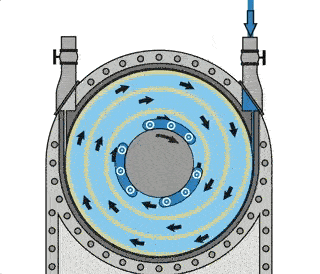

Tesla bladeless turbine schematic | Homeconstructor.de
In order to take advantage of the wind coming from all
directions, people have developed bladeless wind turbines with an
"inverted horn" shape. This wind turbine installed in Hengshui City
can capture wind energy in all directions and make full use of the breeze.
After the airflow enters the interior, the speed of the airflow is gradually
increased with the slowly shrinking pipes along the way, and is finally pushed
to the narrowest section. generator to generate electricity.
In addition to "cheating" the wind into their own
bodies to generate electricity, some companies have gone a step further and
returned to the simplest columnar structure, launching the "Ruyi Golden
Cudgel" - Vortex Bladeless.

Bladeless Vortex Vibrator | Vortexbladeless
In addition to "cheating" the wind into their own bodies to generate electricity, some companies have gone a step further and returned to the simplest columnar structure, launching the "Ruyi Golden Cidgel" - Vortex Bladeless.

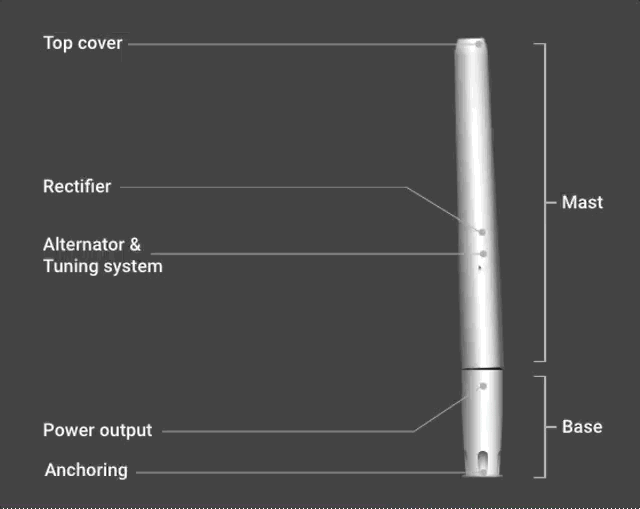
It utilizes the phenomenon of "Karman Vortex
Street": when air flows through it, "vortices" are generated,
inducing reciprocating vibrations in the columns. To put it simply, when the
pillar is shaken, electricity is emitted. However, the efficiency of this model
is extremely limited, and long-term vibration will aggravate the wear and tear
of materials. It does not yet have commercial application value.

"Safinia" | endalldisease.com
The future of vertical axis wind turbines
Also taking advantage of the "vortex shedding
effect" is another bladeless wind turbine, the "Saphonian
bladeless". Compared with the "Golden Cudgel" wind turbine, a
movable disc and a tail rudder (an upright trapezoidal plate) are installed on
the top of the "Safinia".
In 2016, the wind power bus station near the National Music
Center of Iceland was put into operation. The strange-shaped vertical axis wind
turbine above the bus booth provides power for lighting and electronic
products. This unit can not only adapt to low wind speed environments (2
meters/second), but can also work normally in cold winds of hurricane level
(more than 50 meters/second).
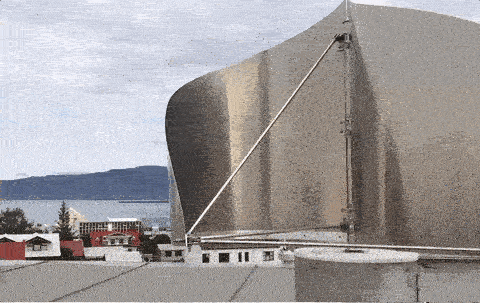
Vertical axis wind turbine in Iceland | Designboom
The axis of rotation of a vertical axis wind turbine is
perpendicular to the direction of the air flow, and generally perpendicular to
the ground plane. Traditional horizontal axis wind turbines need to face strong
winds, while vertical axis wind turbines are open to wind from any direction
and accept all winds.
The structural capacity of vertical axis generators is also
greatly enhanced, allowing them to handle stronger wind levels. These
characteristics make vertical axis generators come to life in the vast ocean.

Floating V-shaped vertical axis wind turbine |
theguardian.com
Intriguing new wind turbine
"EWICON" designed by a Dutch architect is a static
net. There are multiple horizontal insulating tubes placed in the outer net of
a rectangular steel frame. Each insulating tube is densely arranged with
nozzles, which generate electricity through electrodes. Electrical water mist,
the wind blows the water mist to form an electric current, thereby generating
electricity.

In the movie "Big Hero 6", there are many motorboat
generators floating in the sky to provide power to the city. In fact, this
technology has been implemented in real life. The average wind speed at high
altitude is much greater than that at the surface, and the wind speed
fluctuation is more stable. Many companies have set their sights on
high-altitude wind power with huge potential value and created commercialized
"motorboat generators".

Aerial wind turbine in "Big Hero Marines" |
Screenshot from the film

Realistic high-altitude generators | everythinginflatables
In order to make the overall structure lighter, the
"kite wind machine" came into being.

High Altitude Kite Wind Generator | Hazebird
Although these "imaginative" wind turbines look
beautiful, how to efficiently and stably transmit power is still a big problem,
hindering larger-scale applications.
Today, mature three-blade wind turbine technology has been
put into large-scale use, but scientists are still exploring new generators.
The strange appearance is just a superficial phenomenon. Getting infinitely
close to the limit of wind energy utilization is the eternal goal of wind
energy research. These ultimate pursuits beneath the surface of art are exactly
where the romance of scientists lies.
The shape of the blade cross-section is
asymmetrical up and down, flow speed of wind is high when it passes


